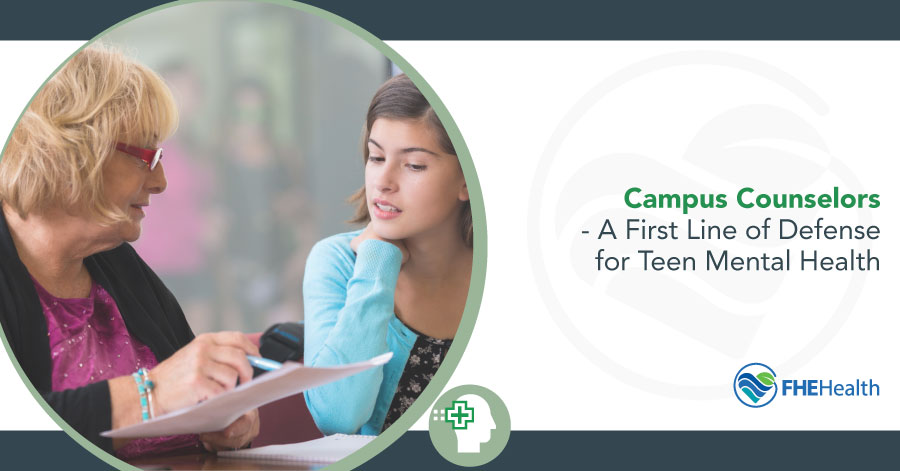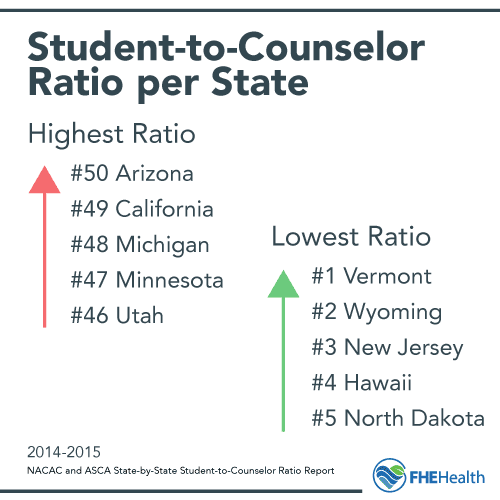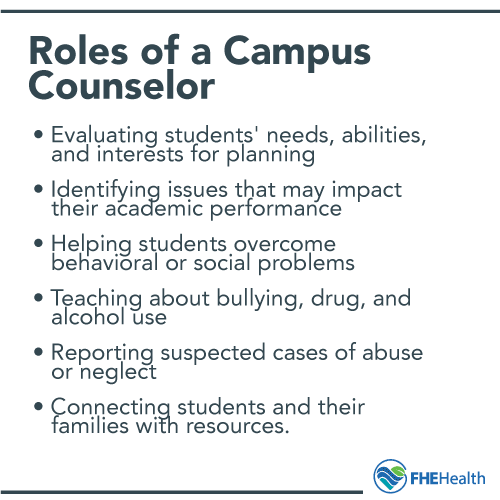
Campus counselors often provide invaluable help to high schoolers, helping them navigate peer, parental and societal pressures, plan for life after high school and address mental health and behavioral issues. This article will explore these and other ways campus counselors provide mental health support to young people.
The Critical Role of Campus Counselors
 Campus counselors can have a profound impact on not only a student’s high school experience but also on their ability to successfully transition to post-secondary education or a competitive job market after high school. That’s one takeaway of a report published by the National Association for College Admission Counseling. Here were some of the findings that add up to this conclusion:
Campus counselors can have a profound impact on not only a student’s high school experience but also on their ability to successfully transition to post-secondary education or a competitive job market after high school. That’s one takeaway of a report published by the National Association for College Admission Counseling. Here were some of the findings that add up to this conclusion:
- In a survey with four options, more than half of school principals selected the option, “helping students prepare for post-secondary schooling,” as their top priority for their campus counseling program.
- In the 2011-12 school year, about two-thirds of all students reported speaking to their high school campus counselor about their post-high school plans. Even when controlling for multiple factors, the report showed that students who talked to a campus counselor regarding their options for life after high school graduation were more likely to have sought out college options, visited a college campus for a tour or program, planned to complete a financial aid form (FAFSA) and planned to enroll in a four-year degree program.
- And, the benefits of campus counselors don’t stop at 12th grade. Counselors continue to play a vital role in a young person’s college career. Without this support, students may not receive the guidance they need regarding their academic abilities, professional expectations and the financial burdens that a college education can bring.
The Shortage of Campus Counselors
Unfortunately, though, there is a shortage of campus counselors starting at the high school level. According to data compiled by the National Association for College Admission Counseling and the American School Counselor Association, the national student-to-counselor ratio was 482:1 in the 2014-15 school year, which is considerably above the recommended ratio of no more than 250:1.
Regrettably, too, one in five high schools across the country don’t have campus counselors, according to the Department of Education’s Civil Rights Data Collection from the 2013-14 school year. This may be largely due to the fact that currently, only 29 states require that high schools have campus counselors. In some cases, the mandated student-to-counselor ratio is higher than the recommended ratio, and in other cases, there is no rule mandating that campus counselors be employed by the school.
Oftentimes, socioeconomic, geographical and racial factors play a large role in the accessibility of campus counselors. Schools that receive less funding are more likely to be attended by at-risk students and are less likely to have counseling options. In other words, the students who could most benefit from access to a campus counselor are often the ones who are least likely to have one available.
Why Do Schools Need Campus Counselors?
Highschool sets the scene for the final transition from childhood to adulthood, paving the way to post-secondary education or entry into the workforce. During this time, students experience significant growth, excitement, frustration, disappointment, and hope as they begin to discover the possibilities of what the future has in store for them.
A primary influence for the typical high schooler is their peer group. Peer acceptance and feedback are paramount to adolescents, helping them navigate the boundaries of socially acceptable behavior and develop meaningful relationships. Unfortunately, during the high school years, the pressure to engage in risky behavior, including sex or drug or alcohol use, increases. Consequently, teens need guidance that their peer group is unable to provide, such as advice about how to engage an online community safely and appropriately and how to use technology to advance their academic and career goals.
In the face of multiple pressures—peer and parental issues, high-stakes testing, choosing and applying to colleges, navigating the financial aid process and preparing for a highly competitive job market—the support of a campus counselor is invaluable. Comprehensive school counseling programs with qualified campus counselors enhance the learning process and promote academic, social and career development.
What Does a Campus Counselor Do?
 Campus counselors have a wide range of responsibilities, including:
Campus counselors have a wide range of responsibilities, including:
- Evaluating students’ needs, abilities, and interests through interviews, aptitude assessments and individual planning
- Identifying issues that may impact their academic performance, such as poor attendance
- Helping students overcome behavioral or social problems
- Counseling students in a one-on-one or small group format to address their needs or the needs of the school
- Helping students create a plan to achieve their academic or vocational goals
- Collaborating with students, parents, teachers and other school faculty to help students succeed
- Teaching students about key topics like bullying, drug, and alcohol use and planning for post-high school careers or higher learning
- Reporting suspected cases of abuse or neglect
- Connecting students and their families with resources outside of the school to address things like housing, food insecurity, and mental health services
A significant portion of a high school campus counselor’s job is to advise students as they’re planning for life after graduation. This can include helping students choose and apply for colleges that are a good fit for their needs and budget, seeking out internships and apprenticeships, writing resumes and improving interviewing skills.
Campus counselors generally have master’s degrees in school counseling or a related field and are usually required to have completed an internship. Those who work in public schools must have a state-issued credential, and some states require campus counselors to have classroom teaching experience or to hold a teaching license.
Other Resources for Students in School
In addition to campus counselors, some schools employ other mental health experts to provide students with guidance and support, including school psychologists and social workers who are specially trained in how the school system functions. These professionals also have an understanding of how students’ mental health impacts their academic success and specialize in areas like education law, classroom and behavior management, learning disabilities, crisis response, and cultural competence.
Unfortunately, the reality is that not every school receives funding for a robust counseling program. To fill in the gap, many communities have non-profit organizations to help students navigate their high school years and prepare for life after graduation. To find academic and career support and mental health services for adolescents in the absence of a campus counselor, students and families can contact resources like the YMCA, their local hospital or a local mentorship program. The Behavioral Health Treatment Services Locator, a service of the Substance Abuse and Mental Health Services Administration, provides anonymous, confidential assistance in finding other resources for students.
The Good News for Students Who Need Mental Health Services
The awareness of the need for mental health services among adolescents is increasing, and some states and districts are making a commitment to hiring more campus counselors. Both high schools and colleges have a better understanding of the mental health challenges that are unique to students, such as bullying, substance abuse, depression, gun violence and the anxiety that comes with academic demands and pressure from friends and family. As demand for qualified campus counselors increases, students and parents can expect to see an increase in the availability of counselors in high schools.






